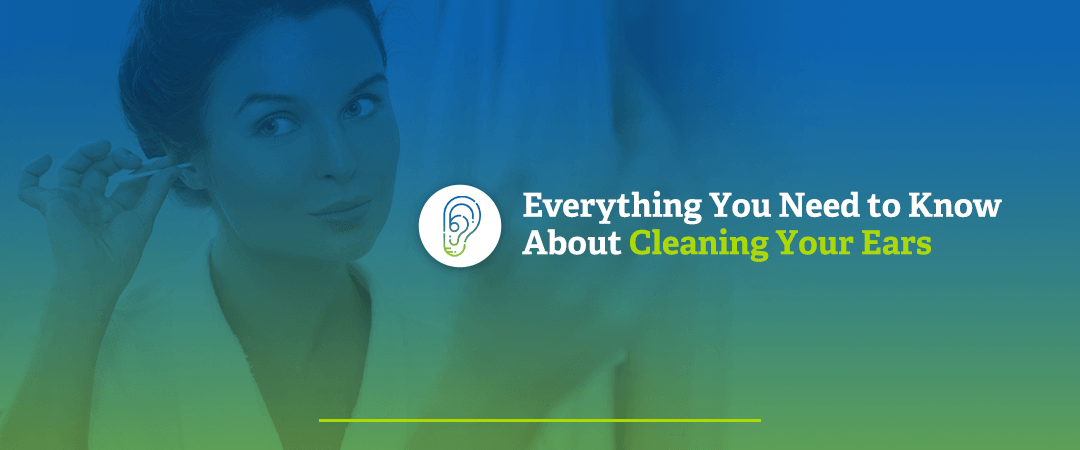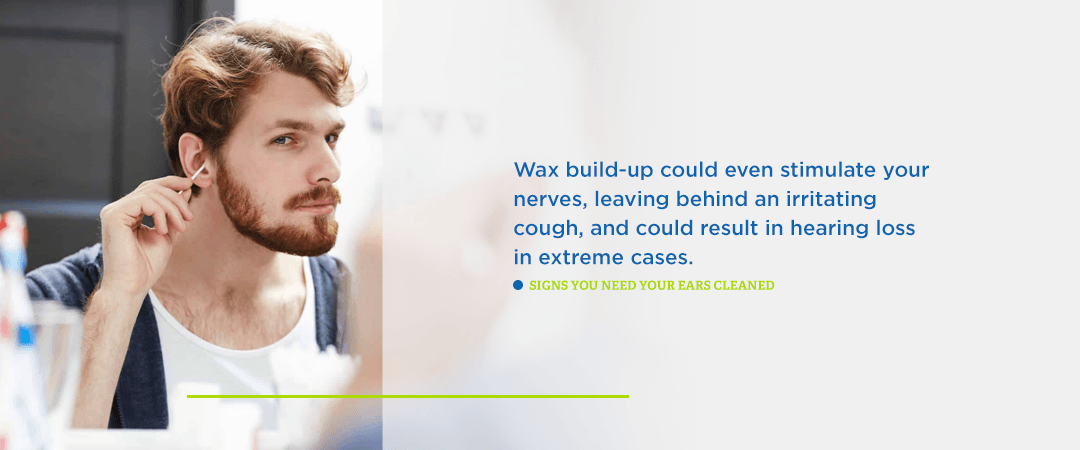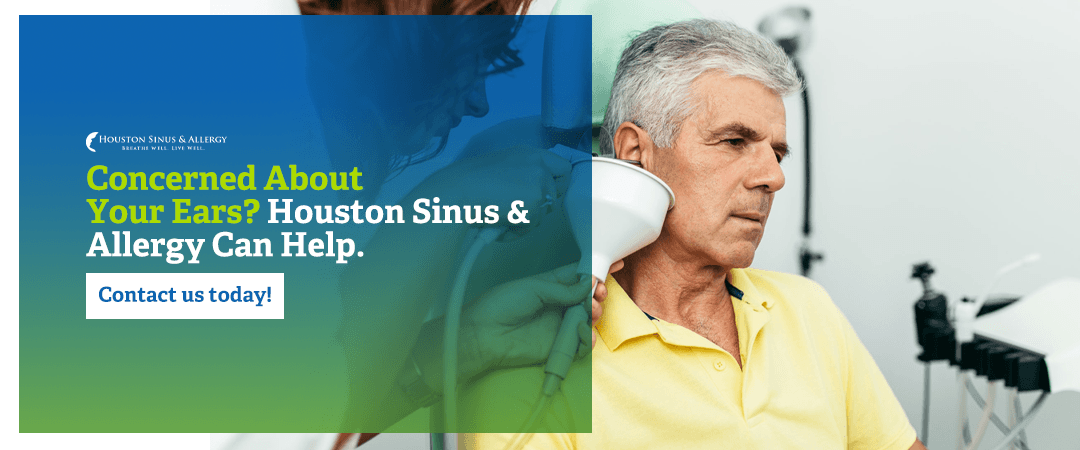
Despite what you might have heard, earwax is completely normal and doesn’t mean you’re not practicing good hygiene. In fact, a normal level of earwax means the opposite and is a sign that your ears are in good health. As a general rule, you should avoid cleaning your ears at home unless necessary, as they are primarily self-cleaning. When cleaning your ears at home, it’s critical that you do so carefully to avoid damage and build-up. It’s also important to schedule regular appointments with a doctor who can assess your ears and address any concerns you have.
Read on to learn more about removing earwax and avoiding potentially dangerous build-up.
Table of Contents
- What to Know About Cleaning Your Ears
- Signs You Need Your Ears Cleaned
- How to Clean Your Ears
- Tips for Cleaning Your Ears
- Concerned About Your Ears? Houston Sinus & Allergy Can Help
What to Know About Cleaning Your Ears
Fortunately, our ears are pretty good at taking care of themselves. Wax — also called “cerumen” — is a normal part of your bodily functions, and it is an integral part of your ear’s performance. Earwax creates a moist, sticky environment inside your ear, which traps bacteria and debris before it enters your canal and travels to your inner ear. Some people produce more earwax than others, which can result from anything from your environment and diet to your age and ethnicity. Excess earwax is usually nothing to worry about, but should other symptoms arise, you might be dealing with build-up. Earwax build-up is called “ceruminosis” and can cause lasting ear damage if left untreated.
If you suspect wax build-up or have any concerns over your ear health, contact a professional for prompt, safe wax removal.
How Often Should You Clean Your Ears?
Due to their self-cleaning nature, you don’t need to clean the inside of your ears regularly. When it’s time for wax removal, schedule an appointment with a healthcare professional to help. For the outside of your ears, including the lobes and external folds, clean them as often as you wash your face or hair to keep them free of dirt.

Signs You Need Your Ears Cleaned
Although it’s a rare occurrence, too much earwax can cause painful, damaging ear blockage and infection. Signs of compacted earwax include dry, flaky or hard pieces of wax near your ear canal. Wax build-up could even stimulate your nerves, leaving behind an irritating cough, and could result in hearing loss in extreme cases. Should you notice a change in your natural wax production, it’s time to schedule an appointment with an ear, nose and throat specialist.
Here are a few more reasons why it might be time to schedule a professional ear cleaning:
- You’re having hearing difficulties: Changes in hearing are always important to tell your doctor. If voices and noises are starting to sound a little muffled or subdued, schedule a consultation.
- You have a hearing aid: Wax build-up can damage hearing aids by clogging vents and blocking receivers, so regular cleaning appointments are crucial.
- You’re getting older: The older you get, the more your glands begin to shrink and produce less moisture. This can cause drier earwax to collect and build up over time.
- Your earwax is darker than usual: Black or darkened earwax can indicate build-up or compaction. It usually gets its color from being in your ear for an extended period and gathering debris.
- You’re experiencing signs of blockage: Serious wax compaction and blockage can have lasting effects on your health. Call your doctor if you notice any feelings of fullness, itching, pain, ringing sounds, or you notice odor or discharge coming from your ear canal. A persistent, unexplained cough may also manifest.
How to Clean Your Ears
The safest and most effective method of ear cleansing requires an experienced professional. An ear, nose and throat doctor will assess and clean your ears with specialized tools and have a better sightline into your ear canal. They’re also trained to recognize symptoms of more serious concerns.
That said, occasional at-home cleaning is usually all right as long as you do not put anything inside your ear canal. Instead, concentrate your cleaning efforts on the external parts of your ear and follow these steps:
- Loosen the wax: The ideal time to clean your ears is when you’re taking a hot shower because all the steam and warm water will help break up the wax. If cleaning outside the shower, you can either use over-the-counter ear drops or a warm oil, like almond or olive, to soften outer earwax.
- Be gentle: Use a washcloth to gently wipe down the outer folds of your ear, massaging in a circular motion. Wipe down your earlobes and behind each ear thoroughly. Be careful not to drip water inside your ear.
- Dry when finished: Once you’re finished cleaning, dry your ears with a towel.
Many drugstores and supermarkets sell complete earwax removal kits. Should you decide to use this method, contact your doctor for a recommendation, as some kits can cause more damage than good.
Tips for Cleaning Your Ears
Now that you know how to handle earwax removal, here are some tips for maintaining healthy, clean ears:
- Avoid cotton swabs: For many people, cotton swabs are a go-to method for earwax removal. Unfortunately, they can do a lot of harm. When you push a cotton swab into your ear canal, you’re also pushing wax back toward your eardrum. This makes it easy for compaction-related damage to occur.
- Don’t use ear candles: Never attempt to clean your ears with an ear candle. Though they used to be advertised as an efficient removal method, they are very dangerous and not an effective way to tackle build-up.
- Practice caution: If you’re experiencing any itching, redness or have an earache, hold off on cleaning your ears. Should you have an infection or injury, cleaning your ear may aggravate and worsen the condition.
- Clean your earbuds: If you wear earbuds or headphones frequently, make time to clean them regularly. Frequent earbud usage blocks necessary airflow to keep your ears clean and may disrupt the natural wax cycle. To combat this, take regular breaks when using earbuds and clean them with an alcohol wipe after each use.
- Talk to your doctor: Monitor your ear health and report any sudden changes or symptoms to a physician. Never ignore ear problems and wait for them to go away on their own. Prompt diagnosis and treatment is the best way to prevent lasting damage or lingering side effects.
Concerned About Your Ears? Houston Sinus & Allergy Can Help.
Earwax is a normal and healthy bodily function that keeps you safe from invasive bacteria and debris. However, wax can build-up over time, which may result in painful compaction or dangerous side-effects. To keep your ears performing at their best, avoid at-home cleaning and seek professional help for any earwax-related concerns.
Contact Houston Sinus & Allergy to learn more about maintaining proper ear health and schedule an appointment today!
Share Tweet Email Ear candling already sounds dangerous even without an explanation of what it is, and it’s likely worse for you than you imagine. A certain amount of ear wax is actually important for preventing infections (though a build-up can make your ears itchy and impair your hearing), so removing it through ear candling […]
Share Tweet Email Are you interested in trying something natural to treat your child’s ear infection? It can be tempting – who wants to overexpose their children to powerful antibiotics and risk building up a resistance to this drug? However, “natural” shouldn’t be confused with “effective” or “safe.” Read on to learn about how some […]

